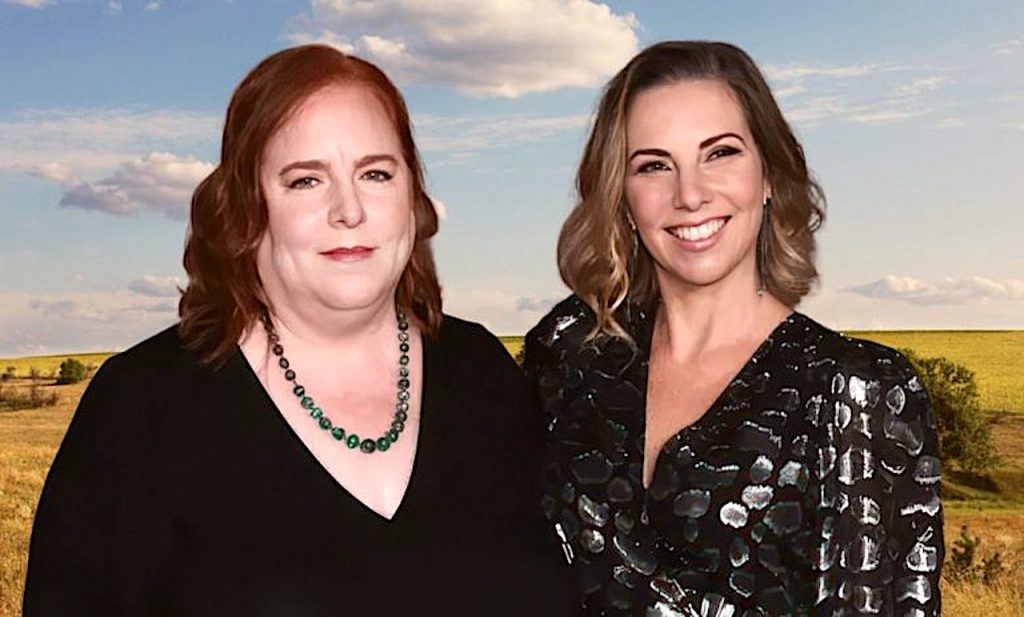- Writing Sisters Nora and Lilla Zuckerman Talk “Poker Face” “Agents Of S.H.I.E.L.D” & All Things Screenwriting (Part 1)
- Writing Sisters Nora and Lilla Zuckerman Talk “Poker Face” “Agents Of S.H.I.E.L.D” & All Things Screenwriting (Part 2)
Lilla and Nora Zuckerman are veteran television writers who have worked on many popular TV shows including Haven, Suits, Prodigal Son and more recently, Poker Face. In this two part interview, they discuss their careers and offer sound career advice to aspiring television writers.
Breaking In
“We were able to break in through the Warner Brothers Writers Workshop, which was this amazing program,” says Lilly Zuckerman, one half of the writing duo. The sisters laude the program because each submission is judged anonymously, purely on the writing talent and potential. Each year around ten promising young writers are trained and offered writing opportunities in the studio.
“We got to meet showrunners, directors, actors, executives. We also ran a miniature writing room where we broke scripts and then we wrote drafts and got notes. At the end of the day, you made it through the boot camp, and if they felt you were ready, they financed your salary to go onto a TV show.”
Lilla and Nora Zuckerman comment that the showrunners are delighted to work with newer writers who were vetted and trained on the machinations of a particular TV show. The Zuckermans subsequently wrote on the J.J. Abrams show, Fringe in 2009-2010.
Another benefit of the now paused writers’ program was the sense of community the writers built as they expanded their professional networks.
Now that Lilla and Nora have climbed the professional ranks to showrunner level, their job of recruiting lower level staff writers has become more difficult as has the task of training the next generation of showrunners since they can longer consider graduates of the writers’ program.
Adds Nora, “We had the experience on Prodigal Son where we worked with two staff writers that came through the Warner Brothers workshop. That was really fun for us to be the elder stateswomen on the staff with these young staff writers, one of which we ended up hiring to be on the staff program base with us.”
Studio writers programs are as close to a meritocracy as Hollywood gets
From Writers To Producers
Lilla and Nora Zuckerman have worked across the spectrum from writers to producers and showrunners. We asked them how wearing so many hats (often at the same time) influences their creative choices. “It’s interesting because when you start pursuing writing, especially in television, you’re really thinking of yourself as purely a writer. And then you get your boots on the ground, you get on a staff, and you realize there’s so much more involved than just coming up with a cool story. It’s really how are we going to produce this, how, you know, how are we going to shoot this, how many scenes take place in this location?,” asks Nora.
She elaborates on their experience on Agents Of SH.I.E.L.D during the Ghost Rider season. “We had to count the number of shots of Ghost Rider because he was so expensive. While we were breaking the Ghost Rider stories on the whiteboard, we had to figure out how much we needed to see him in every shot.”
The Zuckermans highlight the importance of writers understanding the production process as well as finding the opportunity to go on set, especially when your episode is being shot. “It makes you a better television writer. It makes you think practically. You see the realities of TV production, how to shorten a day, how to still make a story make sense in two scenes versus four, and figuring out how to rewrite scenes on the fly.”

Having this mentality while writing is even more important with the new streaming television model where seasons are often compressed to under ten episodes. Thinking practically also allows for more innovative storytelling approaches to be unleashed through fewer resources.
Continues Lilla, “In the long run, having a writer/ producer on set is going to save a network money. I really do feel this current attitude is pennywise and pound foolish. Nora and I have been on several shows where writers were not sent to set early in their careers and I can’t tell you how much money was wasted on reshoots and recasting. If they had sent a writer to set they would be able to make adjustments on the fly.”
What Stories Do You Most Want To Tell?
“Nora and I have been lucky enough to write in a lot of different genres. We’ve written sci-fi, we’ve written on Suits, which is an office legal drama, and we have written on Poker Face, which is a murder mystery, procedural crime of the week show,” states Lilla.
Their writing interests are varied, but there is one constant factor in their work which is “that we always aim to take the audience on a wild ride. When we start thinking about a story, we think about the audience’s perspective and what kind of experience that they’re having. We want to give them a really high octane ride, whether it’s something trippy, terrifying, or hilarious.”
We really think about the audience’s experience when we write
“One of our trademarks is that we’re always aiming to subvert expectations and surprise the audience in a really delightful way. Sometimes we’ve done that in really horrific ways like in Prodigal Son. We’ve also done it zany, innovative ways on Poker Face,” adds Lilla.
“We are not writers that are navel-gazing and thinking about our own life experiences as writers. We’re fans first, so we’re always thinking about that audience experience.”
A key to becoming a fan is to be voracious watchers of television. “I think we know what the audience is going to expect to happen, and then we know how to twist it. And we know how to give you something that you didn’t expect, but you’ll still love and enjoy. We give you what you want, but maybe not exactly in the way that you expect to get it,” expands Nora.
Writing Partnership
Writing collaborations are common, but Lilla and Nora Zuckerman have forged their careers as a writing duo. “I think people are fascinated by the fact that we’re partners and that we’re sisters,” says Lilla. “Nora and I are two very different kind of writers that just happen to work very well together. We know each other’s style and we trust each other. We have a shorthand, but when we’re in the room together, we are very rarely in lockstep agreement all of the time. One person might have this perspective, one person might have that perspective, and there’s a back and forth. And so really it’s like having two brains in the room.”
It wasn’t always this way. When Lilla and Nora started out, they would work shoulder to shoulder. “But now, we’re confident enough to break the script in half and each takes a half to write. Then we rewrite each other.”
As writers we have different perspectives and similar passions
“I think part of the benefit of hiring the Zuckermans is that you do get these two brains,” jokes Nora. “I think Lilla tends to have a bit more of a structure-minded analytical brain. And I may be a little bit more just the idea and imagination of the story.”
There are also times when the sisters switch roles to confuse the other writers in the room. They have also worked with other writing teams, some of which have a complete separation of powers.
Despite the different shapes of writing teams, the assumed creative roles keep morphing. Sometimes one complements the other and sometimes they contradict them.
“I think that generally when Nora and I are in the room together, it is really like gangbusters. We play off of each other, we listen well to everybody else on the team, we can fly with things, we can tell what is passing muster, and which pitches are falling flat. We really do have like a nice rhythm in the room,” says Lilla.
“But there are times too, especially when you’re working on something new, sometimes one of us can say, ‘Hey, I have this character’s voice in my head. Give me a day or two to write some scenes. Let me run with it, and I can show you.”
“It’s not always easy to articulate the voice of a character to someone else. You can hear it in your head, and sometimes it’s easier putting that character in a scene and writing it on your own.” Then the other one reads it and fully grasps the character’s voice. Then they can write the rest together.
These dynamics shift when working on existing TV shows. It’s a see-saw between making sure what they write fits the TV show and infusing it with something truly original. “I think the luxury of television is that on existing shows that have a catalog of episodes or scripts, you can hop in and get that voice,” states Lilla. “When you’re writing original pilots it’s a bit more heart than science,” because everything is constructed from scratch and must be conveyed to the other writers.
